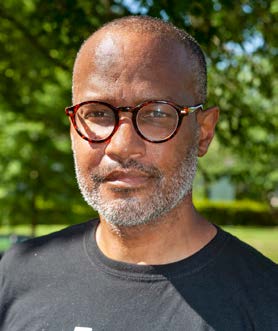
SPECIAL SECTION
Men Moving Mountains
William McNeely
Do Greater Charlotte
By Sonja Whitemon
WITHIN ZIP CODE 28208 in the heart of Charlotte, are many neighborhoods such as Ashley Park, Camp Green, and Revolution Park— mostly low income with nearly double the state and national unemployment rates. In these neighborhoods, the children have big dreams. They are high in creativity and high in passion, but many have few outlets to pursue their desires. William McNeely believes their futures and that of their communities could lie in their creativity and he created a foundation to help these children realize their dreams.
McNeely’s theory is that by facilitating exposure and access to creativity, technology and entrepreneurship that both the children and the communities can move up economically. He reaches them through his foundation, Do Greater Charlotte, which he founded in 2017. By coordinating with CMS schools, Do Greater Charlotte goes into communities with the latest technology and professionals who volunteer to work as facilitators and mentors.
“We have a mobile technology lab filled with the creative technology, such as iPads, TVs and Wi-Fi, that we literally take into neighborhoods and teach entrepreneurship, creative applications, and coding to students who would not have access to this type of technology. Our focus is lack of access and exposure within these communities.”
He believes that the entrepreneurial mindset is the key to success for these kids. The foundation teaches them how to create a business from start to finish.
“We do this from the lens of what they are excited about,” says McNeely. “Sports, fashion, technology– whatever excites them. We focus our entrepreneurship curriculum around that. We find that when we do that kids are much more involved and more likely to understand the mindset principles that we teach and put that into practice.”
“We do this from the lens of what they are excited about,” says McNeely. “Sports, fashion, technology– whatever excites them. We focus our entrepreneurship curriculum around that. We find that when we do that kids are much more involved and more likely to understand the mindset principles that we teach and put that into practice.”
The foundation also focuses on character development, helping students understand who they are and what their passions are and turning that passion into action. Their goal is to turn these children into the next generation of entrepreneurs and critical thinkers.
The pandemic has forced the foundation to reevaluate how it administers its programs. With the onset of Covid-19, it recognized that it needed a physical space. Although the truck was popular and worked well pre-pandemic, the close quarters would not work as well post Covid-19. They also recognized that that when kids were sent home to learn, there was a disparity in resources available to them. Some have state-of -the art technology at home while others have none.
With that in mind, the foundation moved forward with three goals: to provide a space with quality tools and equipment; to provide a creative space that could help kids collaborate and spur creative and critical thinking; and to create a community that could support and nurture these kids.
Partnering with Shiloh Institutional Baptist Church, the foundation is now developing 4000 square feet of space at the church into a co-working, co-learning space for youth. It will be called the Creative Lab at Shiloh.
“This space will rival any coworking space in the community with technology collaborative spaces and it will be a hub for activity not only for the kids but also for a community like Camp Green that’s been tremendously gentrified—new neighbors moving in. It will be a place to bring these communities together,” says McNeely.
Not only is McNeely’s efforts supported by Shiloh Institutional Baptist Church with rent-free space, it is supported by local corporations that include Wells Fargo and AT&T and also 30-40 smaller companies that provide graphics support, vehicle maintenance and other in-kind services. The foundation also receives individual donations to sustain it. Companies or individuals interested in being a part of this mission can reach the organization through its website, www.dogreater.org
“This space will rival any coworking space in the community with technology collaborative spaces and it will be a hub for activity not only for the kids but also for a community like Camp Green that’s been tremendously gentrified—new neighbors moving in. It will be a place to bring these communities together.”
ⓒ 1996 - 2021 Pride Magazine | Charlotte, NC
